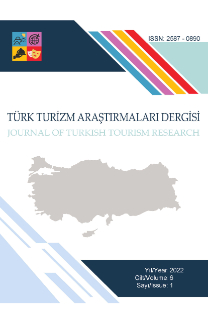Turizmin Etkileri Olumlu mu, Olumsuz mu? Türkiye’de Yapılmış Çalışmalara Yönelik Bir İnceleme
Turizm, ulusal ve uluslararası kitlesel insan hareketliliğine dayanmaktadır. Bu hareketlilik doğası gereği destinasyonlarda farklı etkilere neden olmaktadır. Turizmin destinasyonlarda yarattığı bu etkiler üzerine literatürde pek çok çalışma bulunmaktadır. Bu çalışmanın yola çıkış noktası da literatürde turizmin etkileri üzerine yapılmış olan çalışmaların karşılaştırılmasıdır. Bu çalışmanın temel amacı turizmin etkileri üzerine yapılmış çalışmalardan hareketle turizmin destinasyon üzerindeki etkilerinin değerlendirilmesidir. Bu amaçla 2000 yılı sonrasında Türkiye’nin farklı destinasyonlarında nicel, nitel ve karma yöntemlerle gerçekleştirilmiş toplam 51 makalenin bulguları içerik analizi ve meta analizi teknikleriyle incelenmiştir. Elde edilen bulgular turizmin sosyal, kültürel, ekonomik ve çevresel olmak üzere dört faktör altında toplanabilecek olumlu ve olumsuz sonuçları olduğunu göstermektedir. Araştırma sonuçları, turizmin ekonomik alanda olumlu etkilerinin, çevresel ve sosyal alanda ise olumsuz etkilerinin ön plana çıktığını göstermektedir.
Are the Effects of Tourism Positive or Negative? A Review of the Studies in Turkey
Tourism is based on national and international mass human mobility. This mobility naturally causes different effects in destinations. There are many studies in the literature on these effects of tourism in destinations. The starting point of this study is the comparison of the studies on the effects of tourism in the literature. The main purpose of this study is to evaluate the effects of tourism on the destination based on the studies on the effects of tourism. For this purpose, the findings of 51 articles which have been conducted in different destinations in Turkey by quantitative, qualitative and mixed methods after 2000 were examined by content analysis and meta-analysis techniques. Findings show that tourism has positive and negative results that can be gathered under four factors: social, cultural, economic and environmental. The results of the research show that the positive effects of tourism in the economic field and the negative effects in the environmental and social fields come to the fore.
___
- Akış, Roney, S. (2018). Turizm Bir Sistem Analizi (2.Basım), Ankara: Detay Yayınları.
- Belisle, F.J., and Hoy, D.R. (1980). The perceived impact of tourism by residents: a case study of Santa Marta, Columbia. Annals of Tourism Research, 7(1), 83-101.
- Boz, M., ve Özkan Ç. (2019). Sürdürülebilir Şehir Turizmi: Barselona Aşırı Turizm Örneği, 20. Ulusal Turizm Kongresi “Şehir Turizmi” Bildiriler Kitabı, Eskişehir: Anadolu Üniversitesi Basımevi, 838-844.
- Bryden, J.M. (1973). Tourism and Development, United Kingdom: Cambridge University Press.
- Butler, R.W. (1980). The Concept of a Tourist Area Cycle of Evolution: Implications for Management of Resources. Canadiagne Geographer, 24, 5-12.
- Doxey, G. (1975) A Causation Theory of Visitor–Resident Irritants: Methodology and Research Inferences. The Impact of Tourism. In the Sixth Annual Conference Proceedings, 195-198. San Diego: The Travel Research Association.
- Eralp, Z. (1974). Socio-Economic Effects of Tourism towards Communal Changes. Ankara: Ankara University Press.
- Erdoğan, N. (2003). Çevre ve (Eko) Turizm, Ankara: Erk Yayınları.
- Gu, M. and Wong, P.P. (2006). Residents' perception of tourism impacts: a case study of homestay operators in Dachangshan Dao, North-East China. Tourism Geographies, 8(3), 253-273.
- Gunn, C.A. (1988). Vacationscape: Designing Tourist Regions (2nd Ed.), Van Nostrand, NY.
- Haralambopoulos, N., and Pizam, A. (1996). Perceived impacts of tourism: the case of Samos. Annals of Tourism Research, 23 (3), 503-26.
- Holden, A. (2008). Environment and Tourism, London: Routledge.
- Jurowski C., Uysal M. and Williams, D.R. (1997). A theoretical analysis of host community resident reactions to tourism. Journal of Travel Research, 36(2), 3-11.
- Krannich, R.S., Berry, E.H. and Greider, T. (1989). Fear of crime in rapidly changing rural communities: a longitudinal analysis. Rural Sociology, 54, 195-212.
- Liu, J. and Var, T. (1986). Resident attitudes toward tourism impacts in Hawaii. Annals of Tourism Research, 13,193-214.
- Mbaiwa, J.E. (2008). The Socio-cultural Impacts of Tourism Development in the Okavango Delta, Botswana. Journal of Tourism and Cultural Change, 2(3), 163-185.
- Milman, A. and Pizam, A. (1988). Social impacts of tourism on Central Florida. Annals of Tourism Research, 15(2), 191-204.
- Pizam, A. (1978). Tourism’s impacts: the social costs to the destination community as perceived by its residents. Journal of Travel Research, 16(4), 8-12.
- Ross, G.F. (1992). Resident perception of the impact of tourism on an Australian City. Journal of Travel Research, 3(3), 13-17.
- Seraphin, H., Sheeran, P. and Pilato, M. (2018). Over-tourism and the fall of Venice as a destination. Journal of Destination Marketing & Management, 9, 374-376.
- Samırkaş, M. ve Bahar, O. (2013). Turizm, Yoksulluk ve Bölgesel Gelişmişlik Farklılıkları, Ankara: Detay Yayıncılık.
- Şit, M. (2016). Türkiye’de Turizm Sektörünün İstihdama Katkısı, Akademik Yaklaşımlar Dergisi, 7(1), 101-117.
- TUROFED (2019). https://www.turofed.org.tr/_files/_pdf/RAPOR/turofed-turizm-raporu-2019.pdf (erişim tarihi: 20.02.2020).
- Türker, A. ve Çelik, İ. (2012). Somut olmayan kültürel miras unsurlarının turistik ürün olarak geliştirilmesine yönelik alternatif öneriler, Yeni Fikir Dergisi, 9, 86-98.
- UNWTO (2020). https://webunwto.s3.eu-west-1.amazonaws.com/s3fs-public/2020- 01/UNWTO_Barom20_01_January_excerpt_0.pdf (erişim tarihi: 20.02.2020).
- Yılmaz, İ. (2017). İl İl Türkiye’de Turizmin Çevresel, Ekonomik ve Sosyo-Kültürel Etkileri, Ankara: Detay Yayıncılık.
- Williams, T.A. (1979). Impact of domestic tourism on host population: the evolution of a model. Tourism Recreation Research, 4, 15-21.
- ISSN: 2587-0890
- Yayın Aralığı: Yılda 4 Sayı
- Başlangıç: 2017
- Yayıncı: Prof. Dr. Yüksel ÖZTÜRK
Sayıdaki Diğer Makaleler
Thomas Cook Krizinde Otel İşletmelerinin Uyguladığı Pazarlama Stratejileri: Kuşadası Örneği
Yunus BİLGİÇ, Muhammed BAYKAL, Ahu AYYILDIZ
Konaklama İşletmelerinde Algılanan Atmosferin Müşteri Tatminine Etkisi: Kuşadası Örneği
H. Erhan ALTUN, Tuğrul AYYILDIZ
Turizmde Beşeri Sermaye Gelişiminin Rolü: Turizme Bağımlı Ekonomiler İçin Panel Veri Analizi
Turist Rehberliği Mesleğinde Yaşanan Güncel Sorunlar Üzerine Bir İnceleme
nanç Turizmi Açısından Deyrulzafaran Manastırı ve Ziyaretçi Profili Üzerine Bir İnceleme
Türkiye’de Macera Turisti Tipolojisi
Güntekin ŞİMŞEK, Aziz Batuhan DİNÇEL
Bayramören İlçesinde Yamaç Paraşütü Turizmi
Ayhan DAĞDEVİREN, Cansel SARAL, Nariye COŞKUN, Zeynep YILMAZ
